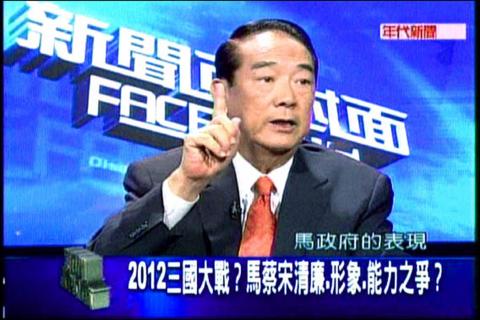People First Party (PFP) Chairman James Soong (宋楚瑜) yesterday said he would register with the Central Election Commission next month and launch a petition to collect the required number of signatures for presidential aspirants.
In an interview with ERA TV last night, Soong said he would pick up the petition form at the commission between Sept. 16 and Sept. 20 and start collecting signatures from supporters on Sept. 22. However, he refused to confirm whether this would be an indication that he was “determined” to run for president.
The number of signatures required to qualify for registration as a presidential candidate is 250,000. Soong, 69, said he would not join the election unless he collects at least 1 million signatures.

Photo: Screen grab from ERATV
“If we successfully collected 1 million signatures, and with proper financial support, of course I would consider serving the people and meet their expectations [by running for president],” he said.
“Launching the petition is an indication of my willingness to run for the presidency, as it is part of the procedure to obtain an admission ticket to the presidential election ... It would be a great encouragement for me if we collected 1 million signatures, and it would be more likely that I would join the presidential election,” he said.
PFP spokesman Wu Kun-yu (吳崑玉) said the signature drive would last 45 days, and Soong would make a final decision depending on the result of the signature drive.
Soong, the only elected governor of Taiwan Province from 1994 to 1998, talked about his experience as a governor in handling typhoons and other disasters.
He said the government needed re-engineering to improve its efficiency and called on President Ma Ying-jeou (馬英九) and Democratic Progressive Party (DPP) Chairperson Tsai Ing-wen (蔡英文) to stop focusing on cross-strait ideology in their election campaigns.
Soong and the PFP were a close ally of the Chinese Nationalist Party (KMT) until conflict between the two parties over election nominations led to a split, which deepened after King Pu-tsung (金溥聰), executive director of Ma’s re-election campaign office, filed a lawsuit against Soong in November last year for accusing King of manipulating the presidential elections by fabricating polls in 2000 and 2004.
King declined to comment on Soong’s potential bid, saying any comments he made could spark disputes and cause misunderstandings.
DPP spokesman Chen Chi-mai (陳其邁) said his party respected Soong’s decision to run in the presidential race.
Ma and King have no one else to blame but themselves on the division of the pan-blue camp, Chen said.
Additional reporting by Chris Wang

ENDEAVOR MANTA: The ship is programmed to automatically return to its designated home port and would self-destruct if seized by another party The Endeavor Manta, Taiwan’s first military-specification uncrewed surface vehicle (USV) tailor-made to operate in the Taiwan Strait in a bid to bolster the nation’s asymmetric combat capabilities made its first appearance at Kaohsiung’s Singda Harbor yesterday. Taking inspiration from Ukraine’s navy, which is using USVs to force Russia’s Black Sea fleet to take shelter within its own ports, CSBC Taiwan (台灣國際造船) established a research and development unit on USVs last year, CSBC chairman Huang Cheng-hung (黃正弘) said. With the exception of the satellite guidance system and the outboard motors — which were purchased from foreign companies that were not affiliated with Chinese-funded

PERMIT REVOKED: The influencer at a news conference said the National Immigration Agency was infringing on human rights and persecuting Chinese spouses Chinese influencer “Yaya in Taiwan” (亞亞在台灣) yesterday evening voluntarily left Taiwan, despite saying yesterday morning that she had “no intention” of leaving after her residence permit was revoked over her comments on Taiwan being “unified” with China by military force. The Ministry of the Interior yesterday had said that it could forcibly deport the influencer at midnight, but was considering taking a more flexible approach and beginning procedures this morning. The influencer, whose given name is Liu Zhenya (劉振亞), departed on a 8:45pm flight from Taipei International Airport (Songshan airport) to Fuzhou, China. Liu held a news conference at the airport at 7pm,

Taiwan was ranked the fourth-safest country in the world with a score of 82.9, trailing only Andorra, the United Arab Emirates and Qatar in Numbeo’s Safety Index by Country report. Taiwan’s score improved by 0.1 points compared with last year’s mid-year report, which had Taiwan fourth with a score of 82.8. However, both scores were lower than in last year’s first review, when Taiwan scored 83.3, and are a long way from when Taiwan was named the second-safest country in the world in 2021, scoring 84.8. Taiwan ranked higher than Singapore in ninth with a score of 77.4 and Japan in 10th with

Authorities yesterday elaborated on the rules governing Employment Gold Cards after a US cardholder was barred from entering Taiwan for six years after working without a permit during a 2023 visit. American YouTuber LeLe Farley was barred after already being approved for an Employment Gold Card, he said in a video published on his channel on Saturday. Farley, who has more than 420,000 subscribers on his YouTube channel, was approved for his Gold Card last month, but was told at a check-in counter at the Los Angeles International Airport that he could not enter Taiwan. That was because he previously participated in two